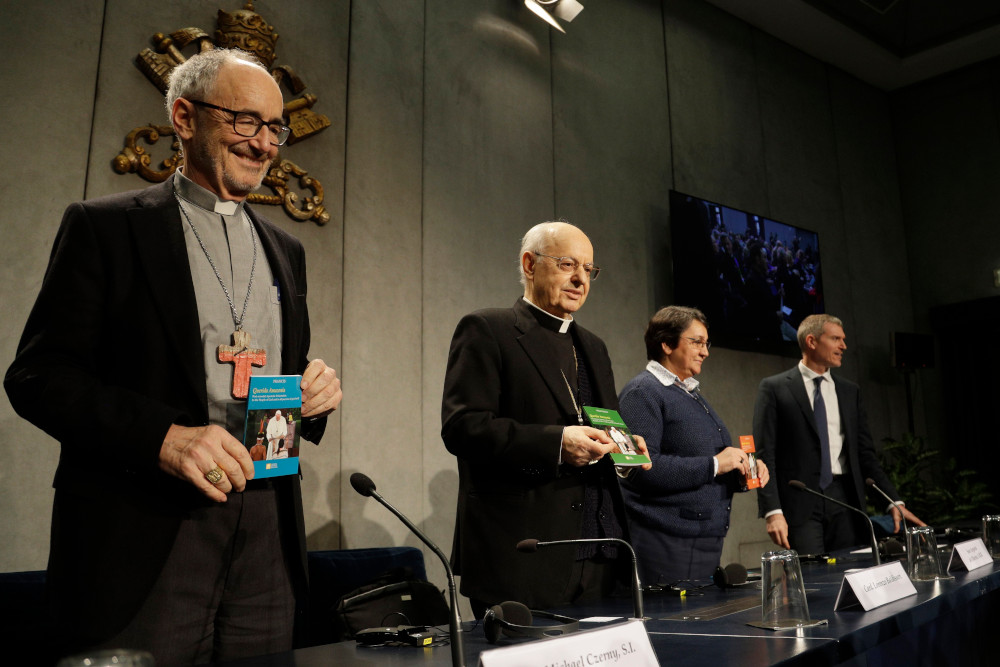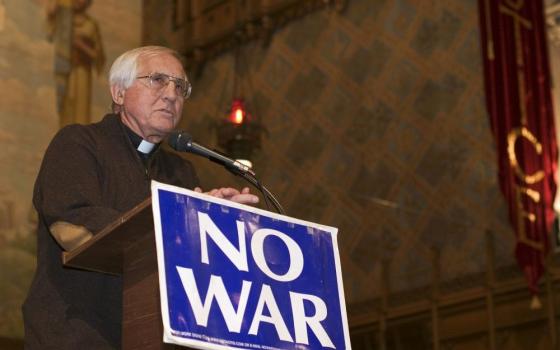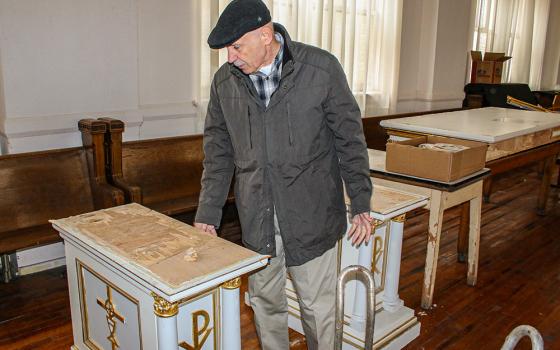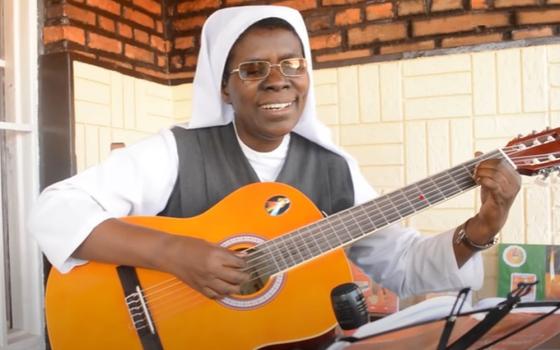
From left, Cardinal Michael Czerny, Cardinal Lorenzo Baldisseri and Sister Augusta de Oliveira hold a copy of the post-synodal apostolic exhortation "Querida Amazonia" written by Pope Francis during a press conference at the Vatican, Wednesday, Feb. 12, 2020. (AP/Gregorio Borgia)
Though 500 years have passed since the Protestant Reformation began in the eastern German town of Wittenberg, traditional and conservative Catholics find themselves eyeing the German church with concern once again.
The country's Catholic bishops recently launched a two-year summit aimed at "newly assessing" long-held Catholic beliefs on sexuality, love and priestly life, including how women are included or excluded by the church.
The "synodal process" began with an assembly held Jan. 30 through Feb. 1 in Frankfurt, Germany, setting the agenda of the controversial topics they aim to discuss for the next two years, from married priests to the recognition of same-sex couples.
But in a country with a long tradition of outspoken theologians, one of the most persistent voices challenging the Catholic Church's current position will come from outside the synod.
"We need a kind of woman church within our church where women can discover and live their own strengths, abilities and charisms — in the sense of empowerment," said Agnes Wuckelt, vice president of the German Association of Catholic Women (referred to as KFD), in a recent interview with Religion News Service. She noted that in the absence of representation, many women are leaving the Catholic Church.
Wuckelt's KFD has submitted a proposal to the German bishops' assembly to promote the appointment of women to leadership positions at all levels of the local Catholic Church, with the goal of paving the way to female ordination to the priesthood.
Wuckelt described this process as "a transition to a gender-appropriate church."
Though German bishops have already voted to increase the proportion of women in leadership positions in their dioceses to 30%, the KFD has demanded that it be increased to 50%.
But this is only a small part of what the theologian sees as necessary to promote gender equality in the Catholic Church. Wuckelt argues for women to be allowed to join the ranks of the diaconate, which would allow them to preach, distribute the Eucharist and officiate at weddings, baptisms and funerals — everything but hear confessions or consecrate the Eucharist.
"The biggest obstacle lies in the sacramental understanding of the diaconate," Wuckelt said, which the church views as an initial step toward becoming a priest, not as an independent ministry. But ultimately, the theologian concedes, she hopes the effect of women deacons will be that "more and more bishops can imagine women as priests.
Four years ago, Pope Francis established a commission to study the female diaconate, but little apparent work has been done since, and the commission's discussions and conclusions have been kept private.
In Querida Amazonia, a document released Feb. 12 wrapping up last fall's Vatican synod on the Amazon region, Francis made no mention of women deacons or married priests, even though these topics were strongly debated by bishops during the summit.
Francis' approach to women's issues has caused many Catholic feminists to regard Francis with ambivalence. "On the one hand, he repeatedly emphasizes the high importance of women for the church. He wants women to participate fully in all decisions in the church," said Wuckelt. "However, he rather represents a classic image of women, as it has been represented by Rome for decades."
Given the chance, Wuckelt said she would advise Francis to include women in his frequent calls for broader recognition of the rights of disadvantaged and disenfranchised people. This also means an "official and sacramental recognition," she said.
Advertisement
She would also encourage the pontiff to invite female and male theologians to counsel him on "finding a wise approach to the theological arguments for the priesthood of women."
Wuckelt quoted a reading by St. Paul, which states that "there are no more Jews and Greeks, not slaves and free people, not male and female; for all of you are one in Jesus Christ." She said that while these words have "been forgotten time and again in the course of the church's history," she believes that "it still challenges male and female Christians alike."
Wuckelt isn't the only one looking for more definitive signals from the pope. A powerful lay group that is co-managing the German synodal process, the Central Committee of German Catholics (ZDK), said in a statement about "Querida Amazonia" that Francis showed a "lack of courage for real reforms."
But Cardinal Reinhard Marx of Münich, who recently announced his intention to not seek a second term as the head of the German episcopacy, took a more optimistic approach, saying that the papal document offers a "framework for reflection" and that the topics discussed during the synod are "by no means off the table."
Wuckelt agreed that Querida Amazonia is not "dismissive of the diaconate of women," adding that if the German bishops submit a very strong vote on the matter, the pontiff might "get involved."
The German bishops' deliberations have provoked mistrust among some Catholic conservatives. Progressive bishops in Germany are viewed in some quarters of the Vatican as a sort of rogue episcopacy, threatening to send a theological and moral shockwave through the Catholic Church in the West.
Traditionalists are already working to minimize the impact of the German bishops' conclusions, arguing that, because Catholicism is a global reality, the bishops of all countries must reach a consensus on the issue of women before any decision is applied.
"In my opinion, this is just an excuse to protest against change and the sharing of power and a feeble means of self-defense," Wuckelt said.
Wuckelt argues that the future of the Catholic Church depends on expanding the role of women. The German synod was born partly out of a reaction to a 2018 report showing thousands of cases of sexual abuse by clergy over the past six decades. According to Wuckelt, appointing more women in decision-making positions might help tackle this epidemic and restore popular credibility to the church.
"We need to discuss this issue from a gender perspective," she said, adding that studies must be made to discover whether female inclusivity could help prevent and detect abuse cases. "In any case," she added, "it must be assumed that the just participation of women in all services and ministries will change the church."
After two years of discussion, German bishops will vote on the hundreds of proposals, including the KFD's, and submit those that pass a majority vote to the Vatican and Francis. While remaining hopeful, Wuckelt said that theological discussions are likely to "take a long time."
"Perhaps our great-granddaughters will achieve this goal," she said.






